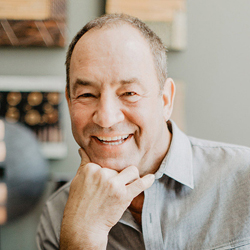Often in popular culture and our common imagination, therapy is presented as cold, detached, and hierarchical. The word “love” rarely comes into the picture, and when it does it is often met with discomfort and uncertainty. What role might love play in therapy. How might love help facilitate our processes of healing and growth? Dr. Roy Barsness, Professor of Counseling Psychology, wrestles with these questions in his practice, research, writing, and teaching. The following two essays—an excerpt from Roy’s book Core Competencies of Relational Psychoanalysis, and a portion of an article Roy co-authored in the Journal of Psychology and Christianity—share some of Roy’s findings about love as a primary factor in healing, and what that might look like in practice.
Grounded Theory Analysis allows the researcher to search for a central explanatory concept or core category which is intended to capture the essence of what has been studied. In this study, I could not escape an overwhelming concept that kept pushing to be named. I was reluctant to name it, because it is too human, and I was afraid it would sound too “soft” for research. But it refused to not be recognized. And it is this—what lies at the heart of a psychoanalytic treatment is love.
It came up in three ways. First, interviewees stated it directly by simply saying, “I love my patients.” Second, I found myself “loving” my interviewees as I was “caught up” in how they expressed themselves with so much joy, care, and compassion for their patients. I found myself “touched” by the intimacy that evolved in their work as they risked themselves emotionally and intellectually, wholeheartedly engaging the analytic process. Third, love came to be defined by the very kind of relationship analysts provide—a relationship that requires of themselves honesty and risk-taking, a deep immersion in the affective lives of the other, and a devotion to scrutinize non-defensively their own selves in an attempt to understand, feel, and grasp the internal and interpersonal world of another. The analyst is willing to resist the urge for self-protection, surrender certainty, and engage in the inevitable conflicts, misrecognitions, and ruptures, and to stay in the conflict until it is worked through. The analyst’s relentless “ethic of honesty”—a Freudian technique that Freud believed an essential requirement in the patient—is now valued by these relational analysts as a requirement also in themselves. It is this honesty that births an unusual authenticity rarely found in human relations, and the primary factor that engenders change and transformation in our patients’ lives.
As I vetted this study, I discovered that some analysts were uncomfortable with the word “love” and some even stated that they didn’t love all of their patients, giving me pause to reconsider love as a core category. So how did it get included? First, it was in the data. Second, just as this research study was developed from a student pushing for clearer practices, it was also a student who encouraged me to include it. Students were aware of the research I was conducting, and many even participated in the literature review for the study. I told them about this thing called love, and that it was controversial. There was a student who had been in the class for two semesters and who had said little to nothing the entire time. I sensed his engagement, but was often curious about his silence. Now, at the end of the semester, having said our goodbyes, he approached me and quite intensely said: “Don’t ever shy away from love…You have brought it, you have lived it, I have bought it, and I believe it…And now, as a new practitioner, I have seen it. Don’t ever give up on love.”
It should be made clear that we don’t “decide” to love a patient, and in fact, if love is in the air, we know that negative affective states are not far behind (and perhaps vice versa). However, isn’t the very tangle of the therapeutic relationship, where we experience the intensity of the full range of emotions, including love and hate, not some form of love?1
He was handsome, confident, articulate, immediately fluid and charming in our interaction, eyeing me to see if I could be of any use to him. Socially sophisticated and gentle in his approach, I was quickly introduced to the intricacies of his life-drama and felt as though I was being auditioned to see if I would become critic or admirer. I sensed he wanted help, but he did not want to be revealed. He wanted to be seen, but not if it meant I might perceive him in any negative way. I was invited in to assist him in his difficulties in living as long as I did not disrupt the fragile persona that he had developed over his 40-plus years. We approached each other tentatively—skeptics, if you will, wondering if we would find authenticity in the other or if we would part left with yet another false encounter. Yet we both stayed. Over time skepticism was replaced with trust and our lives enriched by the other.
Therapy is a profound relational experience that conjures up a myriad of emotion. I can easily report that I love my patients, and I respect their courage and willingness to enter the difficult work of therapy, but often I am caught off guard in that these are not merely words out of a textbook about empathy or unconditional positive regard, but are deeply held feelings that are alive within me.
“These are not merely words out of a textbook about empathy or unconditional positive regard, but are deeply held feelings that are alive within me.”
Such was the case for me with this man when I sensed something well up inside me and discovered that I felt a deep and abiding love for him. This love was not simply “professional,” but was the kind of love that I feel for those I know best: love as a sensation not a concept. I felt excited, desirous, hopeful, emotional, and eager. I felt awe, the feeling of love that says, “this is good.”
I found myself disturbed by this love. Yet I also wanted to revel in it.
I was disturbed because I wondered if, in loving, had I lost my objectivity? Had I lost my way with him in such a way that I could no longer assist him in understanding himself? I was left asking, “Can I love him and be objective? And can I not love him and be objective?”
As I sat with these feelings of love, I must admit I found myself less clinical in this session, less judgmental of his lapses of “mental health,” less energetic to go after his “underlying pathology.” I felt a sense of celebration about the life that we had together so far. I was moved by how he was emerging from being a user and a manipulator of persons, to a lover of people. He was becoming a person who was discovering enough of himself that he was less driven to manipulate sex, women, and others to fulfill his needs. He was getting well. His work had been admirable. I was proud of him. There was cause for celebration.
I am acutely aware at moments like these that I may, in fact, be colluding with patients rather than interpreting underlying patterns of behavior. But this was not what I was experiencing at that moment. His earlier, more manipulative and hurtful way of relating had been tempered with genuine love. I felt his expression of love and, because I felt its genuineness, I too was moved to love.
I believe that my work with patients requires me to analyze and integrate the negative aspects of our relatedness. At the same time, I need to experience and celebrate with patients the lovingness that exists in each of us and often cannot find voice. The task before us, then, is how to connect with, surrender to, love, and be loved by our patients.
We all want to be loved, of course, but we often seek love in ways that it cannot be found. Almost always love is replaced with the need to be admired, taken care of, or desired—almost anything except to be seen and known honestly for our real selves. And yet we “know” that when we are least defended, and when our more real self announces itself, then the Real (God) can be and is revealed. If we believe that God took human form in Christ Jesus, and that through the incarnation we are Christ to one another, then God’s own love comes concretely into our midst through our interpersonal interactions.
“We all want to be loved, of course, but we often seek love in ways that it cannot be found.”
In this moment with my patient, I was reminded that shared knowing lies at the heart of fulfilled love; “For now we see through a glass darkly, but then face to face; now I know in part; but then shall I know even as also I am known” (1 Cor. 13:12). On that day, love shone through. We were face-to-face and, although we did, and will, and do experience many other emotions, on that day love let me see not only the darkness but also the Light. And he saw it too. The news that I heard was the news of love, the news of a self that had long been neglected, that had not been able to give voice. I loved the loved, and the Beloved was with us. And we were both changed.2
1Excerpted from Core Competencies of Relational Psychoanalysis: A Guide to Practice, Study, and Research, Edited by Roy E. Barsness for the Relational Perspectives Book Series. New York, NY: Routledge, 2018.
2Excerpted from “Honor, Wonder, Awe and Love: Sacred Moments in Relationship with Clients” by Wayne T. Aoki, Roy Barsness, and Sam B. Leong, in Journal of Psychology and Christianity, 2001, Vol. 20, No. 1, 80-84.


